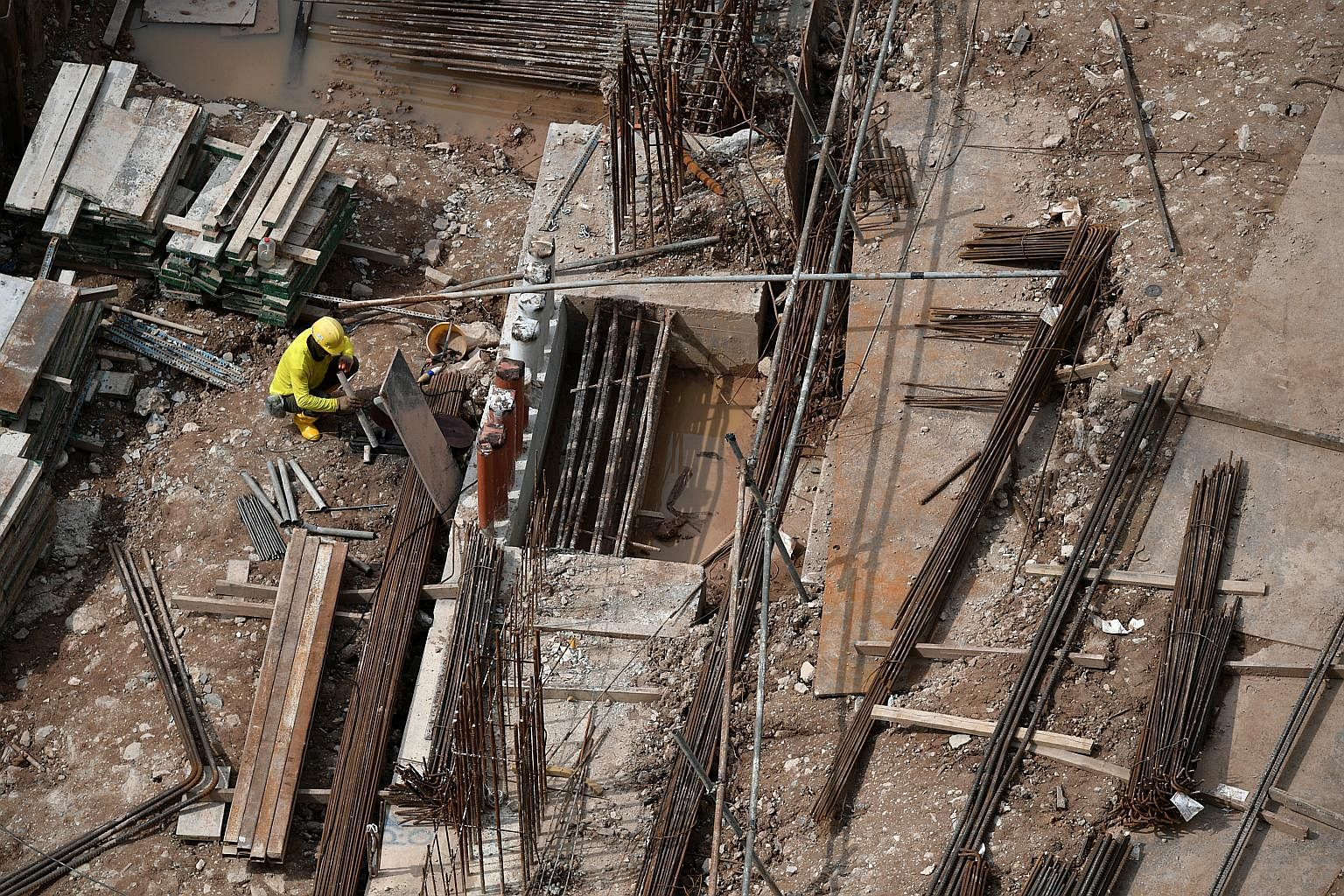S'pore firms affected by Covid-19 border curbs on migrant workers getting more help: Tan See Leng
Sign up now: Get ST's newsletters delivered to your inbox

Construction, marine and process sectors are the hardest hit as they rely heavily on migrant workers.
ST PHOTO: NG SOR LUAN
SINGAPORE - Help is being given to construction, marine and process firms affected by Covid-19 restrictions limiting the inflow of migrant workers, Second Minister for Manpower Tan See Leng said in Parliament on Tuesday (May 11).
The foreign worker levy rebates that about 15,000 of these firms get between May and December will increase from $90 to $250 per worker per month.
Employers can use the increased levy rebates to bring in workers from other countries, such as China, where the workers are typically higher skilled but also command higher wages, said Dr Tan.
But restrictions on having new migrant workers coming to Singapore from higher-risk countries are likely to remain for some time, he added.
"We can only increase these inflows when the situation in these home countries improves, because this is the only way we can ensure the safe inflow of the workers," said Dr Tan.
The Government will continue to engage firms and will continue to review if additional measures are needed to help these sectors, he added.
"In the meantime, we encourage businesses to retain their existing migrant workers and tap on other workers that are already here in Singapore," added Dr Tan, in response to Ms Jessica Tan (East Coast GRC), on mitigating the impact of border closures on businesses.
He noted that many businesses have been badly affected by the border restrictions, with the construction, marine and process sectors being the hardest hit as they rely heavily on migrant workers.
Last year, the number of work permit holders in the these sectors declined by nearly 60,000 - a 16 per cent dip, said Dr Tan.
To help alleviate the manpower crunch, between November last year and April this year, an average of 5,100 S Pass and work permit holders per month were granted entry into Singapore, said Dr Tan.
Non-Constituency MP Leong Mun Wai asked why non-residents who lost their jobs last year were not required to leave Singapore immediately.
Dr Tan said work pass holders are typically required to leave Singapore within two to four weeks after their pass expires or is cancelled to give their employers time to arrange repatriation and for the workers to settle their personal affairs, such as closing bank accounts.
Each year, about 30 per cent of all pass holders do not continue employment with their original employer and their passes expire or are cancelled, said Dr Tan.
"If the pass holder is able to find new employment before repatriation, there's no reason for us to purposefully force these workers to return to (the) home country," he added.
If the Ministry of Manpower (MOM) had insisted on workers leaving Singapore even after finding a new employer, it would have had to allow the entry of nearly double the number of workers last year, adding further strain to the country's stay-home notice facilities and compounding the manpower difficulties currently faced by businesses, said Dr Tan.
MOM reviewing extending validity of in-principle approvals
Dr Tan also responded to Leader of the Opposition Pritam Singh (Aljunied GRC) on whether MOM would continue to extend the validity of its in-principle approvals (IPAs) for companies to bring migrant workers to Singapore.
Companies that wish to bring in migrant workers have to first submit work permit applications to MOM, which will grant the IPA if the application is successful.
After obtaining the IPA, the companies have to apply for entry approval for the migrant workers to enter Singapore - a separate process that was introduced in view of the Covid-19 situation.
Mr Singh said he had heard of some companies having to apply for entry approvals for their workers "30, 40, almost sometimes 50 times for one IPA".
In response, Dr Tan said that while the IPA is granted as long as the company fulfils MOM's requirements, entry approvals are dependent on several factors, including Singapore's risk quota.
Entry approvals are also dependent on prevailing border restrictions, as well as the availability of facilities for the workers to serve their stay-home notice.
The backlog of applications for entry approvals has been building up significantly, even before the latest set of travel restrictions on the South Asian region, Education Minister Lawrence Wong said in his ministerial speech on the Covid-19 situation on Tuesday.
In his response to Mr Singh, Dr Tan said that generally, companies that are unable to obtain entry approvals within the validity of their IPAs will get an automatic extension of one month.
But with an increasing backlog of entry approvals, any further extensions of the IPAs would not make sense, given the uncertainty around the Covid-19 situation, he added.
Extending the validity of the IPAs is "something that we are now reviewing", said Dr Tan.
In response to Mr Singh's suggestion on refunding companies for their IPA applications if they are repeatedly unable to obtain entry approvals for their workers to enter Singapore, Dr Tan said this is something MOM is considering.
MOM as well as other government ministries and agencies are also looking at bringing in migrant workers from non-traditional sources, but this will take time, said Dr Tan.


